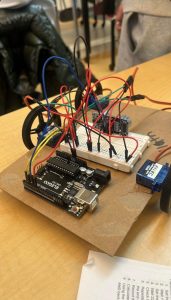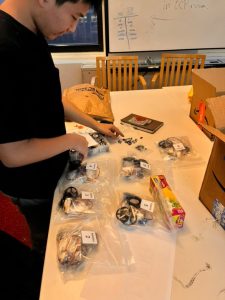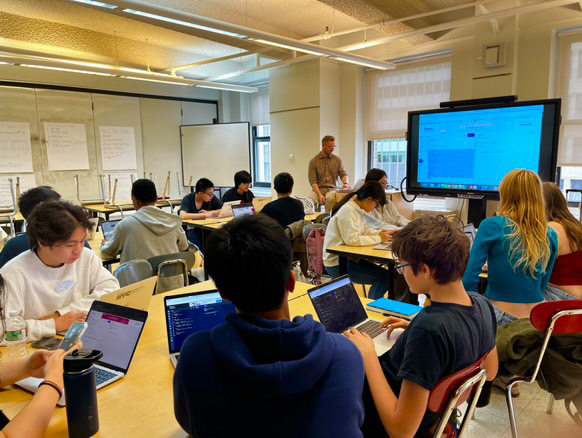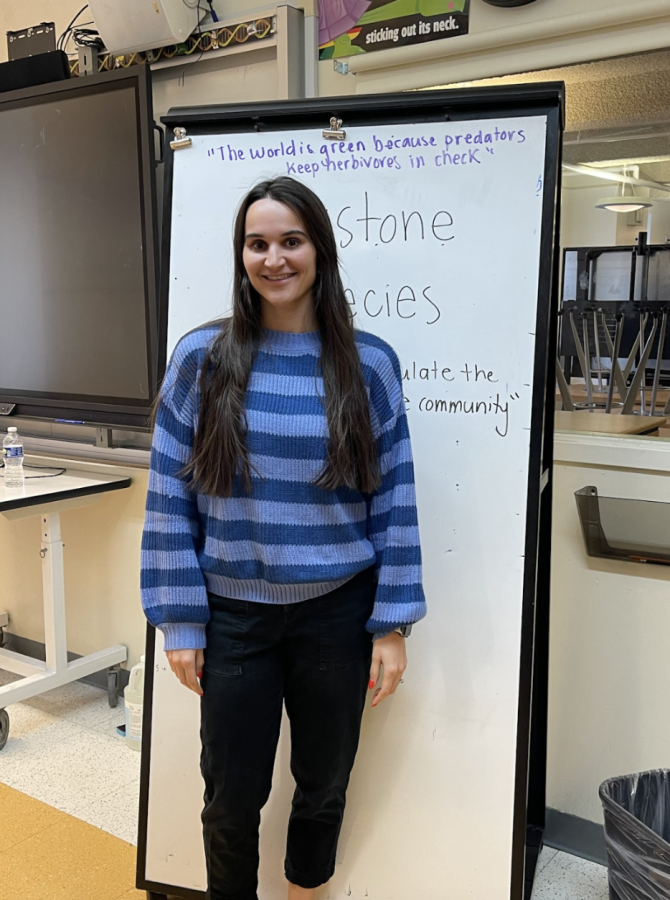What inspired you to create this club?
In my sophomore year, I joined an FTC team that was part of the FIRST robotics league. Many schools around New York have a FIRST robotics team, which competes in robotics competitions with other schools. Our school doesn’t have one, but I was fortunate enough to join a community team on behalf of the MCSM robotics team. They were forming another sub-division of their team and were taking community members. I got to experience that and go to competitions and see all sorts of innovative systems and mechanisms that students our age we’re cooking up across the city. However, due to scheduling issues, I couldn’t continue there, so I wanted to bring it back to Millennium.
Since we don’t have funding for a full-scale 50 grand robotics team, the next best thing was to start with Arduino, which doesn’t do the things a FIRST robotics system does, but it has its own set of input and output systems that allow you to be creative with its capabilities. Most household appliances like your alarm clock or your doorbell have microcontrollers that contain the code for what the system does. That’s basically what Arduino allows us to build. The system’s core is a microcontroller called the Arduino Uno, which controls the input and output systems in the gadgets we build.
Was finding an advisor, funding, etc., challenging?
Definitely! We wanted to start the club last year, but we couldn’t since we weren’t able to find an advisor on time. Mr. McEvoy was really interested in our initiative, so he said to just give it another year and see if anything else popped up. Little did we know he hired two teachers, one  of whom had just happened to have experience in robotics programming. I like to think Mr. McEvoy did it for us.
of whom had just happened to have experience in robotics programming. I like to think Mr. McEvoy did it for us.
In terms of the funding, we wanted to start it off as a FIRST-team, but just to join a competition, you need $250. All your materials are really expensive, all the club management costs and all the teacher expenses end up adding up to a lot of money. We couldn’t do all of that because we didn’t have the funding. However, we managed to convince Mr. McEvoy to pay for our other materials that were within a certain reasonable budget.
What is your favorite part about the club?
Unlike typical robotics teams, the goal behind our club is to have a team of robotics students who are well-equipped with the skills needed to code and build Arduino systems. This would establish the club’s future and ensure that we have a good few years of student-led robotics development at MHS. What makes our club special is that you have the freedom to do whatever you really want. Right now, a lot of our students are complaining that the club feels almost like a class and that they’re not doing anything fun as a club. It might feel like that at first, but it’s really important that we understand how our software and hardware work. That way, later in the year, when we want to make our own things, we know how and what to do, allowing us to take control of our projects. My plan for the future of the club is to be as little involved as club leaders and let the students figure it out for themselves.
What’s your least favorite or hardest part about managing a club?
Well, when I see other clubs in this school, like Unicef or Key Club or all these clubs centered on volunteer hours and club opportunities, everyone is always having fun. Then I look at robotics, where you’re learning something that might not always be fun. I can tell you right now decoding 300 lines of code is never fun, and it sucks at the moment that I can’t provide a fun activity for our members to do, but it does pay off later when you know how to do something and can incorporate it into something more fun.
on volunteer hours and club opportunities, everyone is always having fun. Then I look at robotics, where you’re learning something that might not always be fun. I can tell you right now decoding 300 lines of code is never fun, and it sucks at the moment that I can’t provide a fun activity for our members to do, but it does pay off later when you know how to do something and can incorporate it into something more fun.
For the past 6 weeks, we’ve been doing lessons. The week right before the break, we had our first Hackathon. During these weeks, I got to see Mr. Thorn lecturing us on how to code and how to manage servos. Everyone was actually paying attention, so when we got to the Hackathon, a lot of the kids were looking up their own code, writing their own code, and putting together circuits, and by the end, we had some really cool systems that students built by themselves. I know that Max and Leo, 2 of our members, built their own digital clock system, which was really cool to see because I got to see all the payoff from all these weeks.
Do you have anything planned for the club in the near future?
One of the future things we plan to do in the club is allow students to design their own casings that they could 3D print afterward. That’s gonna lead us into our final project of the year, where after they’ve learned their hardware, CAD, and basic circuitry skills, we’ll have them solder their own circuit and build their own gadget. I know Juwon and Victoria wanted to build their own alarm clock. I think Selby and I are gonna make our own 3D-printed car that we’re gonna have controls for. All those things later in the year are what we’re aiming for.
What would you say to anyone interested in robotics after this article has been published?
 If you’re looking for a club at MHS that has something new to do every week that is engaging and fun in the moment, I don’t think robotics is the place. But if you’re looking for a place where you come in and you understand the hard work, and you do the hard work, and you’re willing to wait for the payoff, then it’s a great place. One of the first things that we agreed on for the club was to first focus on building our skills and learning, which will enable our members to engage with the materials and each other in a meaningful way, allowing them to build an environment that can benefit the club as a whole. Our hope is that for the next year, lower house students will be able to rise up in the club and make their own curriculum to the point where they can teach their own classes and software. This year isn’t an engaging club, but it’s a stepping stone to something bigger.
If you’re looking for a club at MHS that has something new to do every week that is engaging and fun in the moment, I don’t think robotics is the place. But if you’re looking for a place where you come in and you understand the hard work, and you do the hard work, and you’re willing to wait for the payoff, then it’s a great place. One of the first things that we agreed on for the club was to first focus on building our skills and learning, which will enable our members to engage with the materials and each other in a meaningful way, allowing them to build an environment that can benefit the club as a whole. Our hope is that for the next year, lower house students will be able to rise up in the club and make their own curriculum to the point where they can teach their own classes and software. This year isn’t an engaging club, but it’s a stepping stone to something bigger.
What are the big goals you have for the club in the future?
One of the main things we have in mind is to one day have the funding, sponsors, and resources to compete as a Millennium robotics team. Another thing that is unique about our robotics club is that we’re not only looking to our school or fundraisers for our funding, but we’re also looking to make connections with other companies. We look past our sources of funding at our school and look towards the entirety of the city to provide that. You don’t only get to interact with your own club members, but you interact with business people and pitch an idea to them to get something in return, which is a crucial developmental step in any club. So, if you asked me where I see the robotics club in 3 years, we have sponsorships from other companies, self-sufficient sources of money, and members dedicated to teaching others.
Opinion from Writer:
Overall, I find clubs such as robotics incredibly refreshing for forming their own path. It’s a club that doesn’t compare itself to the rest and instead focuses on itself and its own goals. As someone who founded a club, I understand the struggle of finding funding and forming a new club. It’s incredibly difficult to start something from scratch and find success. Debate, the club I founded, only started going to tournaments in its second year. I hope clubs like Robotics achieve all those hopes and get the funding that they desperately need.




